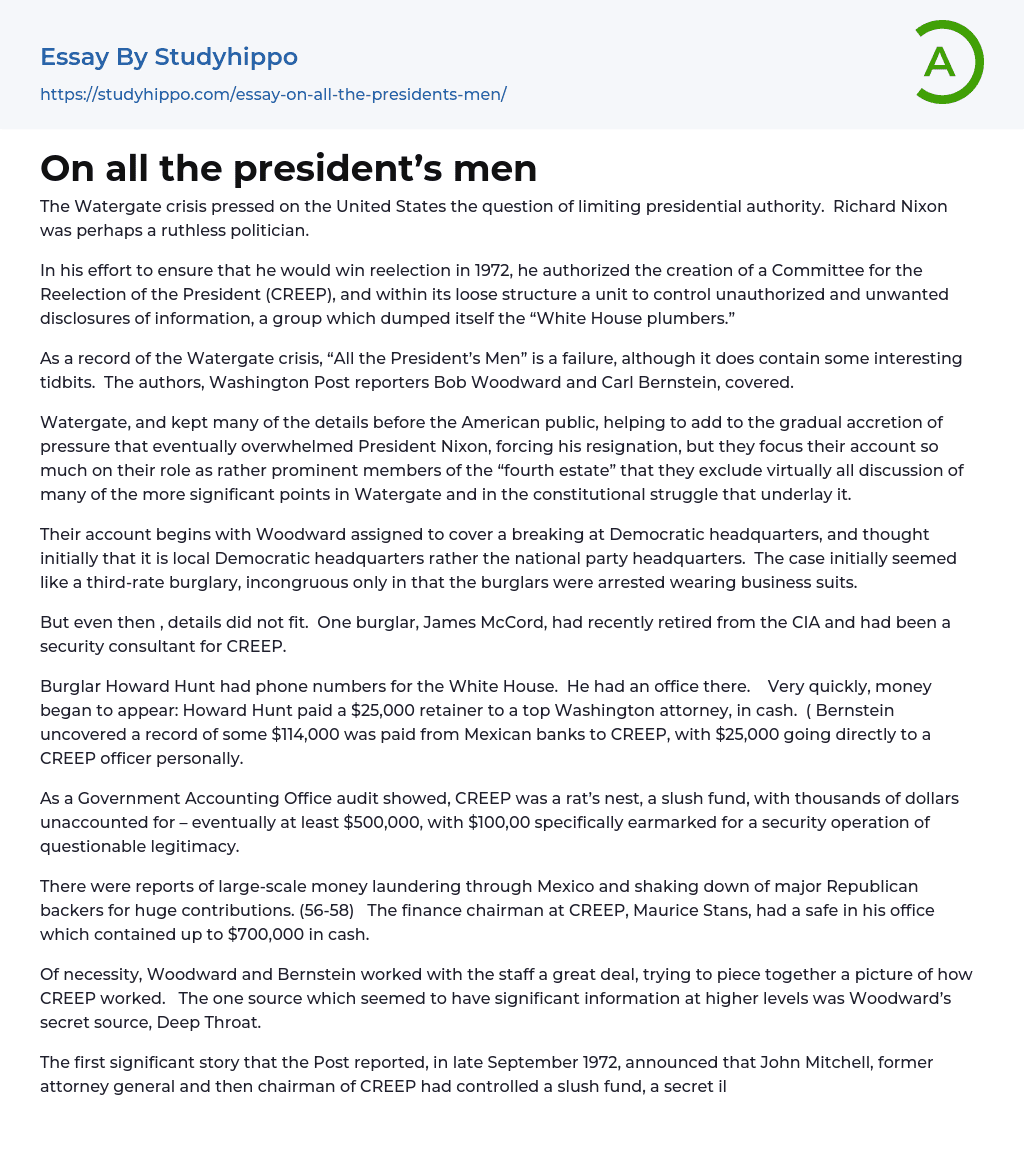The Watergate crisis forced the United States to confront the problem of limiting presidential power, shedding light on Richard Nixon's potential ruthlessness as a politician.
In order to ensure his reelection in 1972, he authorized the creation of a Committee for the Reelection of the President (CREEP), which included a division called the "White House plumbers" that was responsible for handling unauthorized and undesirable information leaks.
"All the President's Men," written by Bob Woodward and Carl Bernstein, fails to effectively document the Watergate crisis despite its inclusion of intriguing details. Woodward and Bernstein were reporters for the Washington Post.
The media played a significant role in informing the public about Watergate and its details, which resulted in increased pressure that ultimately forced President Nixon
...to resign. However, the authors of the text primarily concentrate on their influence as members of the media and overlook crucial elements of Watergate and the accompanying constitutional struggle.
Woodward's narrative commences with his assignment to cover a developing situation at the Democratic headquarters. At first, he mistakenly believed it was the regional Democratic headquarters instead of the central party headquarters. Initially, the incident appeared to be a minor burglary, made even stranger by the fact that the burglars were apprehended wearing professional clothing.
Despite this, the details did not coincide, as James McCord, who was one of the burglars, had recently departed from the CIA and was employed as a security consultant for CREEP.
Burglar Howard Hunt possessed contact information for the White House as he maintained an office there. Shortly thereafter, funds started to materialize. In cash
Howard Hunt provided a $25,000 retainer to a prominent Washington lawyer. Investigative journalist Bernstein revealed evidence indicating that a total of $114,000 was transferred from Mexican banks to CREEP, with $25,000 specifically allotted for a CREEP officer.
A Government Accounting Office audit uncovered that CREEP was an disorderly and dishonest slush fund, with a substantial amount of money unexplained, ultimately reaching a minimum of $500,000. Furthermore, $100,000 was allocated for a security operation that lacked credibility.
Reports surfaced regarding extensive cases of money laundering in Mexico and the extortion of significant financial contributions from prominent Republican supporters (56-58). The finance chairman of CREEP, Maurice Stans, maintained a secure office safe holding a sum of cash reaching $700,000.
Woodward and Bernstein had to work closely with the staff in order to reconstruct an understanding of how CREEP operated. Their main source for crucial information at higher levels was Woodward's clandestine informant, Deep Throat.
The Post's initial major story, published in late September 1972, revealed that John Mitchell, the former attorney general and current chairman of CREEP, had been in control of a slush fund. This fund was a covert and illegal source of financing for campaign activities.
Woodward and Bernstein's most significant discovery was the revelation of Donald Segretti's actions. Segretti, an inexperienced individual, engaged in what he referred to as "ratfucking," which involved unlawful activities that undermined different efforts of the Democratic party. As a result, Segretti faced professional consequences such as being disbarred. These scandalous activities had a profound impact.
The revelation by The Post of these actions revealed the malicious and small-minded nature of Nixon's campaign, where
winning at any cost became the norm. Woodward and Bernstein later discovered that CREEP had paid a member of a fraternity to infiltrate and surveil a group of Quakers who were holding a vigil at the White House.
Given the significance attributed by the Post to these specific items, it is understandable that Woodward and Bernstein devote a considerable portion of their book to this content. However, in the larger context, Donald Segretti and the fraternity boy were inconsequential figures. If Richard Nixon's wrongdoing was limited to their actions alone, few people would have been aware or worried.
The White House criticized the Post for its alleged bias towards the Democrats and anticipated its eventual rejection. Meanwhile, the Post made a significant error by publishing an article featuring interviews with Hugh Sloan, the former CREEP treasurer. Woodward and Bernstein's report unveiled that H.R.
Haldeman, the White House chief of staff, was implicated in the Watergate scandal, which sparked widespread criticism towards the White House's attempts to refute the reports. Bernstein and Woodward faced accusations of embellishing their information, leading to intense scrutiny of their newspaper. Despite Bernstein's comprehensive article examining the absence of denials in the White House's counterattacks, it had limited impact on enhancing the newspaper's standing.
During the crisis, Woodward sought assistance from Deep Throat. The meeting was portrayed in a more dramatic manner in the movie adaptation of the book.
- Armed Forces essays
- Confederate States Of America essays
- Federal government essays
- Federal Government Of The United States essays
- Fourteenth Amendment To The United States Constitution essays
- Governance essays
- Jurisdiction essays
- Parliament essays
- Politics essays
- Bureaucracy essays
- Congress essays
- President essays
- Separation Of Powers essays
- United States Congress essays
- Abraham Lincoln essays
- Andrew Jackson essays
- Barack Obama essays
- Bill Clinton essays
- Donald Trump essays
- Franklin D. Roosevelt essays
- George W. Bush essays
- George Washington essays
- James Madison essays
- John F. Kennedy essays
- Lyndon B. Johnson essays
- Richard Nixon essays
- Theodore Roosevelt essays
- Thomas Jefferson essays
- Vice President essays




